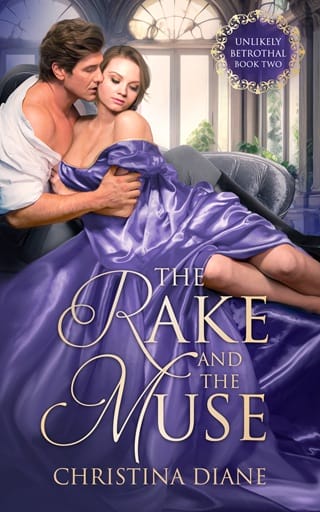Chapter Twenty Four
“ S weet Jesus above, what ails ye, Bridget?” Shoney lifted her head from her sick pan to look through bleary eyes at Morna.
“Good morrow, Morna,” Shoney muttered.
“Not good at all, it would seem.” Morna knelt and swept Shoney’s hair back from her face. “Ye look green, my dear, and ye’re as warm as an egg plucked out from under a hen.”
“’Tis nothing, Morna. I must have eaten something that soured my stomach.” Shoney began to stand but stopped as another wave of nausea sent her reaching for the pan. Morna soothed her back. “There, there, Bridget. Ye’ll feel better once ye get it all up.”
Shoney groaned and fell back on her pallet. If only it were that simple. “I’m sure with a little rest, I will be fine,” she said.
“Aye, to be sure, Bridget. Still, I plan to keep an eye on ye today.” Morna pulled Shoney’s blankets beneath her chin .
“Rest for now. I will be back in just a little while to check on ye.” She placed a kiss on Shoney’s brow, and then she was gone, leaving Shoney alone with the overwhelming madness of her thoughts.
She was drowning in desolation, and despite how she tried, she could not trudge through the mire of her thoughts to a place of peace. No longer could she discern where her true self ended and her alias began. She felt as much Bridget as she did Shoney. Her sense of self, tradition, and faith, given to her by her mother, were being stripped away, leaving her feeling weak and disloyal. Whether she should honor her mother and her heritage or Ronan was an unremitting battle that twisted her mind during the day and haunted her dreams at night.
Her mother was dead as was her past. Why should she cling to what had already come to pass when she could have a future together with Ronan, surrounded by family and friends, laughter and love? But then her throat closed. She could not draw breath. Her thoughts brought her back to that which she wanted most to forget—her vision.
Over and over again, she saw her love fall and swords penetrate his body. Nevermore would she see his face, and never would he know his child. She sat up and retched again. Her body was racked with sobs. She could not breathe. She could not think. She had to find peace from her fear or, surely, she would lose her baby. Then she imagined her little hut on the cliffs and knew she needed to go home.
She was careful to slip away from the village unseen, cutting through the forest before stepping out onto open land. The autumn wind whistled over the moors, rushing through her hair and pulling at her tunic. The stark hills had lost summer’s emerald hue, and the tangled patches of heather, which stretched their fingers over hill and jagged rock alike, had started to fade and wither. Shoney inhaled the crisp air, reveling in the wildness of the land.
When she finally glimpsed her hut and the cliffs beyond in the distance, she quickened her pace. A flutter of excitement pulsed through her. Soon, she was kneeling at the Dervaig Stones in the foreground of her home, hanging her head in reverence. She prayed to the Mother of all for guidance and for help understanding the mysteries of her heart. In that sacred place, she remained for some time, hoping to hear the soft croon of ancestral voices on the wind, but all she heard was the welcoming cries of the Black Backed gulls.
It was at the edge of the cliffs that she felt her strength return. The rich salty sea air assailed her nostrils, awakening her senses. The sharp winds rolling off the sea blasted her core with exhilaration, and her heart matched the pounding beat of the surf against the cliff side. She could not say why or how, but a peace settled over her then. Reaching her hands to the sky, she spun, laughing for the first time in days and days. The answers she sought were near. If she remained mindful and patient, she would find them. Smiling, she turned from the sea and entered her home.
Her eyes welled with tears when she gazed about her quiet quarters. She could feel her mother’s presence in the room. Warm memories floated around her, soothing the last of her fear away. She wrapped her arms around her belly, and for the first time, she spoke to her child, telling her that she was loved and welcome.
Everything was just as she left it, except for the dust. With gladness, Shoney went to work, opening the door and window to invite in fresh air and checking buckets outside for rainwater to use for washing. She started with her table, cleaning each earthen bowl and tool. She thought of how useful many of the salves and herbs would be to the village if she decided to return.
Would she return?
Could she really abandon her new home and her beloved friends? Life without them seemed hard to imagine, but she shook her head and let her fear drift away. Somehow, she would know what to do. Next, she decided to gather her tunics and kirtles to shake outside. She pulled her clothing from their pegs, including her cloaks, but her hand froze when she reached for what hung on the final peg—the cloak of the Witch of Dervaig.
She dropped the bundle of clothing on the ground and stared at the cloak. Taking a deep breath, she reached a hesitant hand and warily pulled it off the peg. Overcome by the cloak’s two opposing powers, her hands shook as she held it. The cloak was her greatest protection. By instilling fear into the minds of the villagers, it allowed her to move confidently over the isle. It represented anonymity and freedom, but that was not all. The dark, tattered fabric was also a prison. It shackled her to life as an outcast, a life without Ronan .
The cloak seemed to sneer at her, mocking her new-found resolve. She moved to the center of the room and fanned the fabric out, resting it on her shoulders. Pulling the hood down low over her brow, she hunched her back and limped across the floor. Her friends would scatter with terror if she hobbled into the village, but what would they do if she suddenly stood straight and flung the cloak from her shoulders? It was too terrifying to consider.
“I knew I would find ye here,” said a voice.
Shoney whirled around, astonished to see Ronan’s mother standing in the doorway, but Anwen did not seem in the least surprised to find her in the Witch’s hut, wearing the Witch’s cloak.
“How...how did ye know?” Shoney stammered.
“Morna came to me in a panic, saying ye were ill and missing. She is afraid ye’ve come down with a fever and wandered off in yer delirium.” Anwen chuckled. “She has the whole clan searching for ye. When I could, I slipped away.”
Anwen reached toward Shoney and gently slid the hood back and swept the cloak from her shoulders. “Ye see, Bridget, I knew just where to find ye. From the moment I first laid eyes on ye, I have known who ye are.”
“Ye’re not afraid?” Shoney whispered.
“Of ye?” Anwen laughed. “My dear, who could ever be afraid of ye?”
“Many people, otherwise, ye would not have come in secret.”
“Perhaps,” Anwen replied.
“How did ye know?”
Anwen took hold of Shoney’s hands and smiled warmly. “Let us sit together by the fire, and I will tell ye a story.”
Shoney sat across from Ronan’s mother. Her hands were tight fists of anticipation while she waited for the elder woman’s tale to begin.
“Many years ago, when I was a young girl of six years, I wandered away from the village and into the woods. It was not long before I realized I was lost. Not knowing which direction to take, I sat on a fallen log and began to cry. It was then I heard a sweet little voice. I lifted my head and wiped my eyes and saw the prettiest little girl, the likes of which I thought only lived in dreams. She, no older than I, knelt before me and took my hands and told me not to cry. She was going to save me. Her hair shone like spun gold, and her eyes were as gray as storm swept seas.”
“It was my mother,” Shoney said knowingly.
Anwen nodded. “Ye have the look of yer mother.” Then she chuckled. “I believed that one of the fairfolk had come to rescue me. She gave me berries to eat, and then we ran and played together for hours.” She closed her eyes. “I can still see her running ahead of me. Her golden hair bouncing and her strange eyes smiling as she looked back.” Then she again met Shoney’s gaze. “I always knew somehow when she was waiting for me. I’d make my way to the fallen log and there she would be.”
The fire began to smoke. Shoney added another cut of peat to the flames and waited for Anwen to continue her story .
“For three summers we met. But then at the start of my tenth summer, I went to our spot only to find it empty. Mind ye, I wasn’t surprised. And I will tell ye this, Shoney—I knew, somehow, that she would never wait for me again. My faery would never return.”
“And?” Shoney urged.
“I told ye. I never saw her again.”
“Well, how did ye know who she really was—that her mother was the Witch? Did she tell ye?” Shoney asked.
“One day, I bade her show me where she lived. She led me along the coastal route here to her hut, but we hid outside. She told me her mother would be angry if she knew we were friends.”
“And ye were not afraid?” Shoney asked.
“Never—not even a little. I adored Brethia. She was a big sister to me even though we were the same age. I felt safe with her as though she would always protect me.”
Shoney’s brows drew together. “Why do ye think she stopped meeting ye in the wood?”
Anwen smiled and put her hand on Shoney’s knee. “We grew up, Bridget.”
“Ye know,” Shoney said, smiling shyly. “Bridget is not my real name.”
“I thought not,” she chuckled. “Well, out with it. Who are ye then?”
“Shoney.”
“Ah, she named ye after the god of good fishing. I’m not surprised as yer mother loved to fish and often prayed to Shoney. Aye, that does suit ye much more.”
Anwen leaned close and said, “When we are alone together ye shall always be Shoney to me.”
Shoney turned away. She knew Anwen meant well; nonetheless, she felt betrayed. Would she ever know acceptance?
“I’m sorry, Shoney. I have injured ye. Only, ye must understand that we are all of us part of the same world, and this world is not always just. If it were otherwise, the men we love would not be out there right now fighting and risking all for our safety.”
“Ye must think my concern for my name frivolous,” Shoney began. “But I grieve for much more than that when I answer to the name Bridget.”
Shoney looked beseechingly to Anwen for support. Surely, she, her mother’s companion in youth, would understand.
“Aye, ye feel as though ye’ve brought shame to yer mother. She gave ye a strong name, and she taught ye the ways of yer people, ways which ye reject by coming to the village.”
“Precisely—” Shoney began, but Anwen interrupted.
“Here me out, Shoney,” she implored. “A mother’s greatest desire for her child is life—to live. There are many villains that would slay a child and many ways for a heart to die. There is of course life stolen by war, disease, or accident, like my first son, Nachlan. But there is also death which comes when all joy is lost. In this case, the body may still breathe and move, but the heart is broken beyond repair. If ye remain here, alone, under the darkness of yer cloak, yer heart will die. I know this, Shoney. I have watched ye grow in joy since yer arrival even though I know ye have often been unhappy, but there is a difference. Joy is what sustains even when despair sets in.”
“I have found great joy, first Ronan and then the people of Gribun, ye and Morna and Una. Ye all have come to mean so much to me. I feel loved and necessary, two things impossible to find in solitude, but...,” she trailed off, not wishing to acknowledge her fear.
“But what, Shoney?” Anwen implored.
“I am a fraud.”
“Nay, that is not true. Yer affection is genuine, and yer help very real. Deception is often necessary in life. Do not fool yerself into thinking truth is always the noblest pathway; sometimes it destroys more than it creates. Think of all the good ye have done, all that ye have made that would be undone.” Anwen smiled slyly. “Think of the baby growing inside ye.”
Shoney inhaled sharply, once again surprised by Anwen’s awareness.
“I have watched ye closer than ye think. My son loves ye. He made that quite clear to everyone before he left.” Her penetrating eyes bore into Shoney’s. “Yer silence confirms my suspicion.”
Shoney nodded. “Aye, Ronan’s child does grow inside me.”
Anwen smiled and pulled her into a warm embrace.
“Nay, please don’t.” Shoney pushed her away. “I have not decided where my future lies. Becoming Bridget is to surrender. ”
Shoney stood up and walked to the doorway and pointed to the sacred stones. “All of the women who have come before me have worshiped at those stones. At some point, each woman would have been forced to decide—stay and be true to themselves, refusing yer law and yer religion, or leave, seeking out a new life. My mother refused to surrender. Now I am faced with that choice. If I leave, then I lay waste to all that my mother endured.”
“But where does it end, Shoney? Is yer child to be raised in isolation, one day being left alone, faced with this impossible choice?”
Shoney’s mind reeled. Anwen was right. Now that she was with child, it was not only her future she must consider. Her daughter, like Shoney, would find herself alone one day, faced with the same desolate isolation, assuming she had a daughter. What if she birthed a son? What kind of life would he know?
Anwen smiled reassuringly. “Shoney, regardless of where ye live and by what name ye take, my delight is unwavering. Ye carry my grandchild. Nothing can change that. But I have one question.”
“If I have an answer, it will be yers,” Shoney replied.
“Have ye made any promises to Ronan?”
She blushed crimson with embarrassment and anger when she remembered their last night together. “Only to remain in the village until his return.”
“Then on his behalf, I ask ye honor this promise and return with me now.”
But what if he doesn’t return, her heart screamed. She was dizzy and about to be sick again .
“Shoney, rest for a minute. ‘Tis the baby. I suffered terrible sickness too.” Shoney did as Anwen suggested, and soon the waves of nausea passed.
“I will return, Anwen, but first I must speak.” Shoney took a deep breath. “I love him. I do. This I will not deny, but despite what ye may believe deception can twist even that which is most pure. Our life together is based on pretense. If ever the truth were revealed, the consequences might be unthinkable.”
“No more unthinkable than if ye denied Ronan yer love or yer child the love of his father but let us not argue.” She took Shoney by the hand. “These things have a way of working themselves out, ye’ll see.”
Shoney doubted that very much, but honored Anwen’s wishes not to argue.
They left the front door together arm in arm. Despite the tangle of questions threatening to trip her every move, she felt unburdened. She hoped knowing that someone else in Gribun was aware of her true identity would strengthen her sense of self, reinforcing the boundaries between myth and reality—Bridget and Shoney.
She stopped to once more honor her mother at the Dervaig Stones.
“If ye permit me, Shoney, I would speak.”
“Of course,” she replied.
“Yer mother was no different than any other mother.”
“What do ye mean?” Shoney asked.
“More than anything,” Anwen said. “Yer mother would want ye to live.”
 Fullepub
Fullepub 



